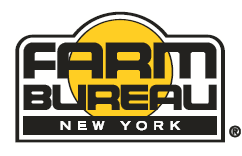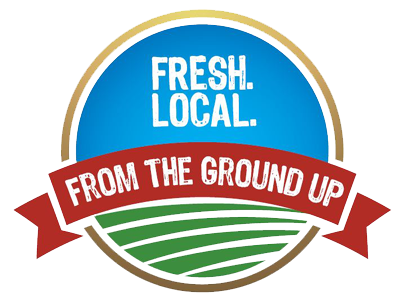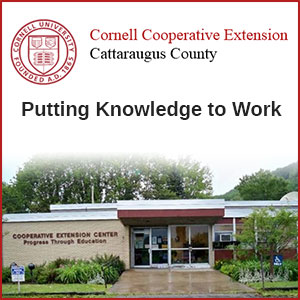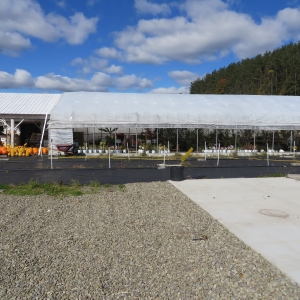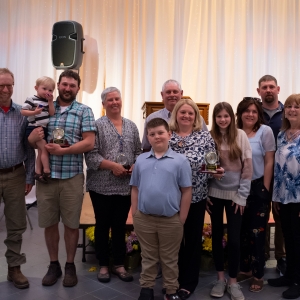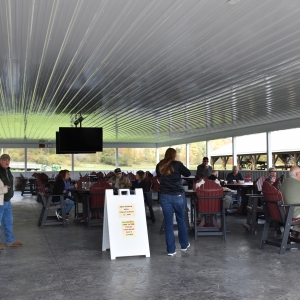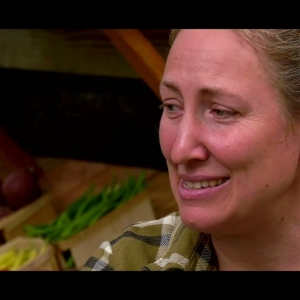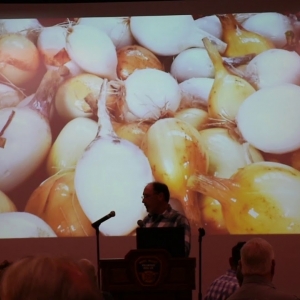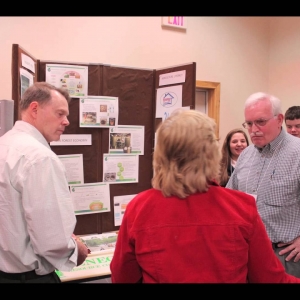Other Ag News:
WASHINGTON, July 31, 2024 – The Biden-Harris Administration today announced it has issued payments to eligible applicants under the Inflation Reduction Act’s Discrimination Financial Assistance Program (DFAP), which aims to provide financial assistance to farmers, ranchers, and forest landowners who experienced discrimination prior to January 2021.
Dominique Smith recently graduated from Tennessee State University with a bachelor’s degree in agricultural sciences with a concentration in agribusiness. She recently accepted a permanent position with the U.S. Department of Agriculture (USDA) and credits her experience in the USDA 1890 National Scholars Program in helping her secure the position.
WASHINGTON, July 31, 2024 – The U.S. Department of Agriculture (USDA) today announced the names of individuals who hold senior staff positions in Washington, D.C.
Carlton Bridgeforth has been promoted to White House Liaison in the Office of the Secretary.
Editor’s Note: This post is part of a multi-part series exploring some of the key sustainable agriculture and food systems challenges that the farm bill can address. Through a series of posts comparing the House and Senate Agriculture Committees’ proposals, we provide an assessment of how each chamber’s bill would address a given challenge, and our recommended path forward. Our first post focused on local and regional market access. Future posts will explore how the next farm bill can tackle issues in meat processing, crop insurance, organic and sustainable agriculture research, and more.
Urban agriculture is a longstanding practice in communities to serve as a form of food sovereignty, resistance, mutual aid, and entrepreneurship. Urban farmers and community garden networks cultivate, process, and distribute food utilizing micro-scale and innovative production techniques. While these practices predominantly exist in urban and suburban areas, incorporating support for these practices throughout the US Department of Agriculture (USDA) has the potential to extend economic and social benefit beyond urban centers.
USDA and Urban AgricultureThe Office of Urban Agriculture and Innovative Production (OUAIP) promotes the viability of urban farms and addresses food insecurity in neighboring communities. The Office itself is a fairly new USDA initiative, yet it has already had a significant impact in communities nationwide. The Office invests in organizations and localities through grants and cooperative agreements to:
- Increase the capacity of agricultural production in urban areas and through innovative methods;
- Research and develop local policies or zoning regulations that support agricultural production in urban and suburban areas;
- Develop and implement food waste reduction or management plans that promote soil health through compost;
- Provide educational opportunities to youth and communities that encourages gardening and promotes health and well-being.
Additionally, USDA has recently established seventeen new Urban Service Centers with urban conservationists to bring farm financing and conservation funding to urban areas. In light of historical distrust and skepticism of USDA within communities of color, the Farm Service Agency funded organizations in these seventeen regions to conduct outreach about incoming new services. However, a number of these partners were not community organizations that held established relationships with urban producers in those regions or had experience in urban production methods. Many of these agreements were initiated earlier this year, and to date, only a few of the new Urban Service Centers have physical locations. Therefore, the effectiveness of these partnerships to drive farmers to new USDA services remains to be seen. OUAIP received funding for the first time in FY2020. It saw small but steady increases (from $5 million to $8.5 million) from FY2020 – FY2023, but has since been caught in annual funding fights, risking its progress.
Growing Urban Agriculture Microgrant Opportunity for San Francisco and Los Angeles farmers. Photo Credit: Community Alliance with Family Farmers Farm Bill OpportunityThe National Sustainable Agriculture Coalition (NSAC) has worked with Congressional leaders to identify legislative opportunities to ensure investments better reach farmers and the Office has stable funding, which was introduced as the Supporting Urban and Innovative Farming Act (S. 2591, H.R. 5915) last year.
Both the Senate and House Agriculture Committees include a number of these provisions in their respective farm bill strategies.
The Senate offers a comprehensive solution to addressing funding shortfalls and improving the accessibility of supports to urban producers by incorporating the vast majority of provisions from S.2591:
- Expanding the responsibilities of the office to better serve the conservation and business planning needs of urban producers;
- Enabling community partners to act as an extension of the Office through cooperative agreements, prioritizing organizations that have established relationships with underserved population and experience providing technical assistance to these producers;
- Generating business growth for urban producers by supporting microgrant opportunities and expanding grant eligibility to farmer cooperatives; and
- Investing in the long-term development and growth of the Office by providing mandatory funding at $10 million annually.
The House also includes approximately half of the provisions from H.R. 5915 that would:
- Improve the delivery of USDA conservation and business planning services to urban and innovative farming operations;
- Create more access for funding among producers by supporting microgrant opportunities and expanding grant eligibility to farmer cooperatives; and
- Enable community partners through cooperative agreements.
Unfortunately, the House bill does not include a directive or prioritization for organizations with urban farming experience like the Senate does. This would likely lead to the Farm Service Agency partnering with institutions and inexperienced nonprofits that have the capacity for managing federal grants but not necessarily the experience in supporting urban farmers. Furthermore, the House bill does not provide any mandatory funding. As a result, the House approach could result in additional unmet demand as the applicant pool widens but the funding pool remains unstable.
The Final PathAdequately resourcing the Office of Urban Agriculture and Innovative Production is only one step to ensure all scales and agricultural production techniques are represented in USDA programming. Any final farm bill must additionally:
- direct USDA to consider and develop resources that meet the unique needs of small scale farmers operating in urban and metropolitan areas,
- create opportunities for trusted community partnerships to lead outreach and build relationships between growers and USDA through cooperative agreements,
- expand the reach of grants by funding farmer cooperatives and offering microgrants to urban farmers, and
- invest in research and data collection to understand the prevalence and economic impact of urban and innovative production.
Senator Stabenow (D-MI) has proposed a more comprehensive approach to addressing urban and innovative production services throughout existing USDA services. However, neither the House or the Senate offer the financial resources to fully implement the urban, indoor, and emerging agricultural data collection initiative authorized by the 2018 Farm Bill. Incorporating these practices consistently into the Census of Agriculture is imperative for USDA to adequately understand and serve these producers.
The post Path to a New Farm Bill: Securing Resources for Urban Agriculture and Innovative Production appeared first on National Sustainable Agriculture Coalition.
WASHINGTON, July 29, 2024 – The U.S. Department of Agriculture’s (USDA) Food Safety and Inspection Service (FSIS) today issued a comprehensive proposed rule and determination to more effectively reduce Salmonella contamination and illnesses associated with raw poultry products.
Building a successful commercial urban farm requires careful consideration of unique issues created by farming in the urban environment.
The Cornell Small Farms Program’s Urban Ag project has partnered with USDA-AMS Marketing Services Division and Rooted, the Madison, WI-based center for urban agriculture enterprise and education, to collaborate and develop classes for commercial urban agriculturists, city planners, and policymakers.
The project is informed by our publication, The Promise of Urban Agriculture, a national study of commercial farming in urban areas released in 2019. The following year we began to create trainings and educational resources for multiple audiences engaged in urban agriculture and, specifically, commercial urban agriculture.
“Realizing the Promise of Urban Agriculture sits squarely within the Cornell Small Farms Program’s mission to turn research into meaningful educational opportunities that promote equitable participation in farming in New York State and beyond,” said Anu Rangarajan, director of the Cornell Small Farms Program. “This research and now curriculum illuminate the value of commercial urban agriculture, and will help grow urban farms’ potential to be commercially viable and economically self-sufficient, while offering a multitude of quality of life benefits for community residents.”
This curriculum development draws on the evolution of 14 urban farms, and insights from over 150 policymakers, urban planners, funders, and nonprofit and community organizers engaged in local food systems and urban farming. Through this work we uncovered the policies, resources, and future research and development needed to support the successful development of commercial urban farms.
“The Promise of Urban Agriculture courses offer a holistic approach to both social and operational factors that impact urban farming,” said USDA Under Secretary for Marketing and Regulatory Programs Jenny Lester Moffitt. “Through these courses, small businesses and farmers will be equipped with a greater understanding of the economic, managerial, and financial nuances of urban farm viability.”
We are excited to bring this suite of urban agriculture courses to farmers, planners and policymakers, to provide critical information for building or supporting successful urban farms.
PUA 101: Deciding Where to Farm in the City reviews how to create a commercial urban farm with community in mind. Other topics include urban land access and tenure, and regulations that impact urban farming.
PUA 102: Urban Farm Planning and Management covers factors that contribute to an economically viable urban farm, including choosing a business model, knowing when to expand the farm, crop planning, analyzing markets, managing on-farm labor, and promoting a strong farm culture.
PUA 103: Urban Farming by Community Nonprofits is designed for nonprofit farm staff and members of community organizations that manage urban farms. It goes deeper into the specific concerns of operating an urban farm as a nonprofit.
PUA 201: Urban Agriculture Skills for Planners help planners from any size city or municipality understand how urban agriculture is affected by planning priorities, zoning, comprehensive planning. The course also explores strategies to foster inclusive community engagement, sustainability and equity. The planners course is worth 6 Certification Maintenance (CM) credits through American Planners Association.
“We are excited that Promise of Urban Agriculture courses will activate and spread the wisdom of over 200 urban growers, planners, community advocates, and government officials who contributed to the original research and course development,” said Molly Riordan, an urban agriculture specialist with the project. “They offer tested strategies from the people who’ve implemented them, and we are grateful to all who shared their expertise.”
After participating in these courses, participants will be able to:
- Articulate the physical, economic, and social factors important to building viable urban farms.
- Understand the relevant policy and planning tools that can support or hinder an urban farm.
- Describe the economic opportunities and risks that affect long-term viability and sustainability of urban farms.
- Distinguish when a nonprofit business structure can be more effective in meeting social goals for urban farming than a for-profit model.
Each course is designed as a standalone learning experience with unique video content and materials. Our introductory enrollment offer allows free access to these courses until December 31, 2024.
Learn more and enroll today on our Teachable online school.
The post The Promise of Urban Agriculture: New Courses for Growers and Planners appeared first on Cornell Small Farms.
WASHINGTON, July 26, 2024 – The U.S. Department of Agriculture (USDA) announced that low-income New Mexico residents in parts of Rio Arriba and San Juan counties recovering from the impact of wildfires and flooding that began on June 17, 2024, could be eligible for a helping hand from the USDA’s Disaster Supplemental Nutrition Assistance Program (D-SNAP).
Brunswick, Maine, July 26, 2024 – U.S.
Pages
Signup for the Ag Newsletter
Get the freshest farm news, events and updates from in and around Cattaraugus County, NY at least once a month! Go signup!
Other ways to stay connected:
Get Involved in Farming
Resources for Starting a Farm in Cattaraugus County
Profile of Cattaraugus County soils
Agriculture Career Exploration
Questions about farming? Find out Who to Call

